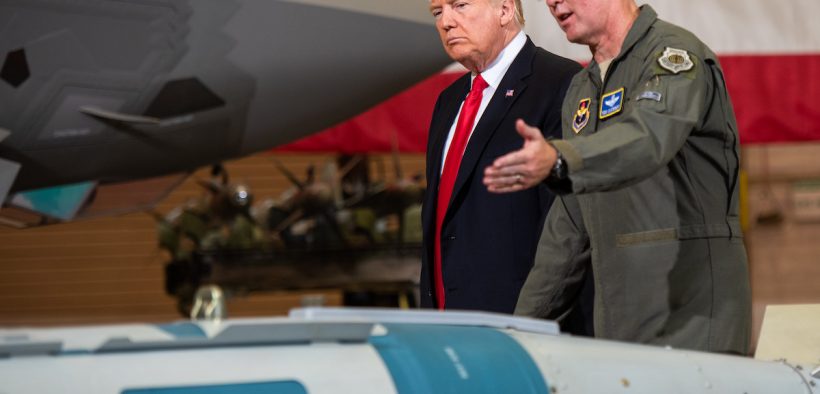Defense Stocks Surge After US Kills Top Iranian General

Endless war is always good for one thing – defense industry profits.
Defense stocks soared on Friday after the Ayatollah vowed revenge for the Trump administration’s assassination of Iran’s most powerful general late Thursday, as investors expressed excitement that flaring tensions could ignite a full-scale conflict and increase demand for weapons of war.
“Aircraft makers Northrop Grumman Corporation and Lockheed Martin gained 17 and 14 points, respectively, while major U.S. missile maker Raytheon rose nearly two percentage points to $228.63 per share,” reported Yahoo News. Economist Dean Baker noted that some defense stock suspiciously surged before the attack:
very interesting that Lockheed's stock went up 2.0 percent on Thursday, the day before the attack. Looks like a lot of people should go to jail. https://t.co/VvlSl4XTpX
— Dean Baker (@DeanBaker13) January 4, 2020
Late last year Congress approved a record $738 billion defense budget for President Trump. Despite attempting to impeach the president because of the threats he poses to national security, House Democrats approved the massive spending package even as it was stripped of amendments that would have forbidden the president from starting wars without congressional approval.
Congress approved the colossal spending package a week after the Afghanistan papers were published, revealing how the U.S. government systematically deceived the public about the war in Afghanistan. “Although the war was a catastrophe for most, it has been massively profitable for the multinational corporations that do business with the U.S. military,” wrote Citizen Truth last month.
“Traditionally, defense stocks tend to outperform the market during periods of budget growth,” reported CCN.
“If Middle East conflict were to ratchet … we think it could be tougher for Democratic Party electoral candidates to argue against a stronger defense budget in 2020, which would remove a defense sentiment overhang,” Citi analyst Jon Raviv wrote in a Friday note to investors. “And as is always the unfortunate case, defense stocks tend to benefit from perceptions of heightened risk and the potential for geopolitical conflict.”
If you are wondering who benefits from endless wars, take a look at how stocks for weapons manufacturers began to rise as soon as Soleimani was killed.
Defense contractors spent $84 million lobbying Congress last year and it certainly wasn’t to promote diplomacy and restraint. pic.twitter.com/Ov1DWV90gE
— Ro Khanna (@RoKhanna) January 3, 2020
Critics argue that the revolving door between private defense contractors and the Pentagon improperly influences public policy to benefit private weapons manufacturers. In November 2018, the Project on Government Oversight (POGO) released an analysis of the Trump administration’s defense sector, finding 645 instances of federal employees working for the top 20 Pentagon contractors in fiscal year 2016. Most of them worked as lobbyists, where they used public funds allocated to them through Pentagon contracts to vouch for policies that would help their private employers profit.
Defense Secretary Mark Esper, for example, spent seven years as the top lobbyist at Raytheon, refused to recuse himself from decisions involving his former employer, and has refused to wait before returning to Raytheon after his public service.
A September 2018 report from The Wall Street Journal provides a clear example of how the defense sector’s revolving door influences foreign policy. The Journal revealed that then-Assistant Secretary of State Charles Faulkner, another former Raytheon lobbyist, convinced Secretary of State Mike Pompeo to continue the U.S. policy of backing the Saudi coalition for the sake of a $2 billion dollar deal with his former employer. Faulkner later stepped down amid scrutiny from the report.
After Trump pulled out of the Iran nuclear deal in 2018, defense companies enjoyed an immediate boost to their stock. As journalist Lee Fang reported last year, executives from Raytheon and Lockheed Martin told investors that the growing likelihood of war with Iran was good for business.
As Sludge reported, congressmembers are also implicated, owning from $515,022 to $1,832,998 in Defense Aerospace stock, $34,006 to $165,000 in Defense Electronics stock, and $18,004 to $95,000 in Misc. Defense stock, industries they are responsible for regulating.
The U.S. is sending 3,000 troops to the Middle East, giving defense companies greater chance to profit amid geopolitical instability and the prospect of full-scale war.














The U.S. government has been completely subverted by special interests — most especially by the zionists and by the military-industrial complex that Eisenhower warned of, to no effect.
“Government of the people, by the people, for the people”? If the American Founding Fathers were alive today, they would organize a full-scale revolution.
Remember Daddy Warbucks? He is richer now than ever before.